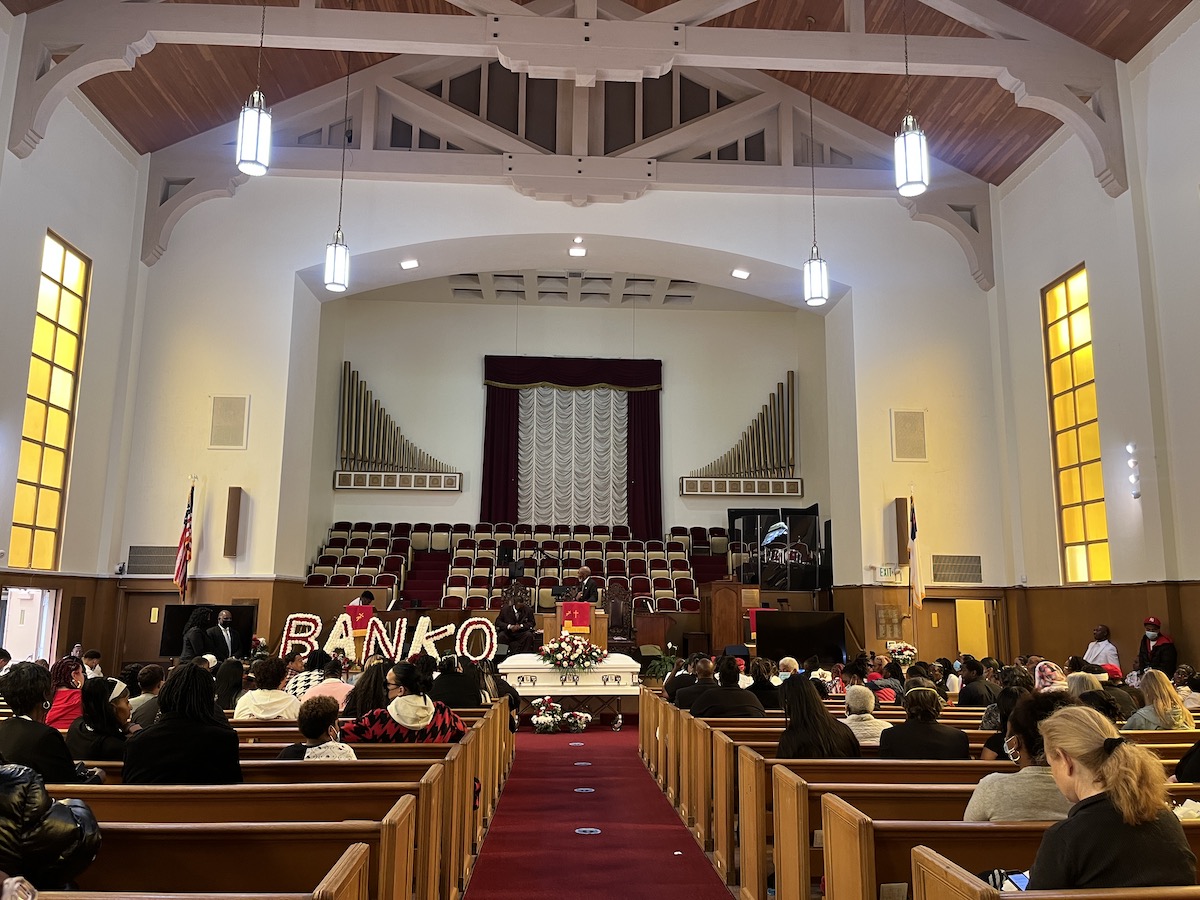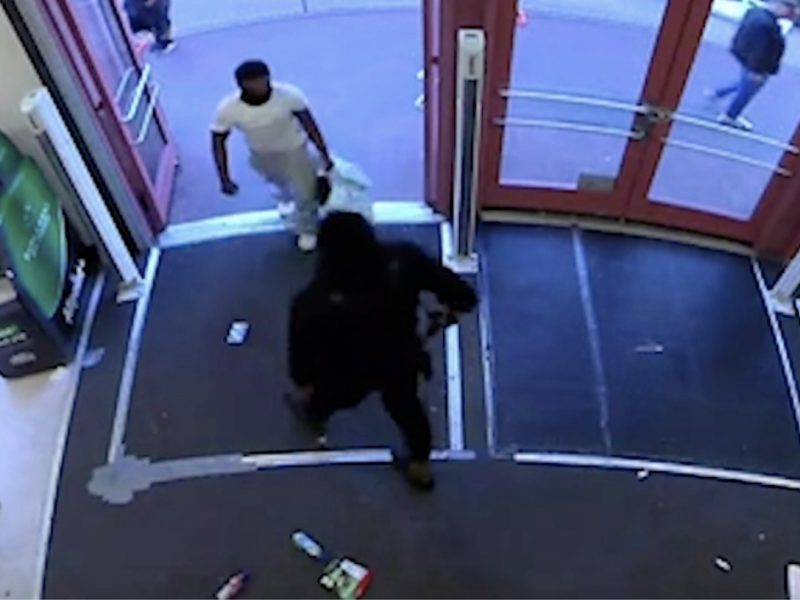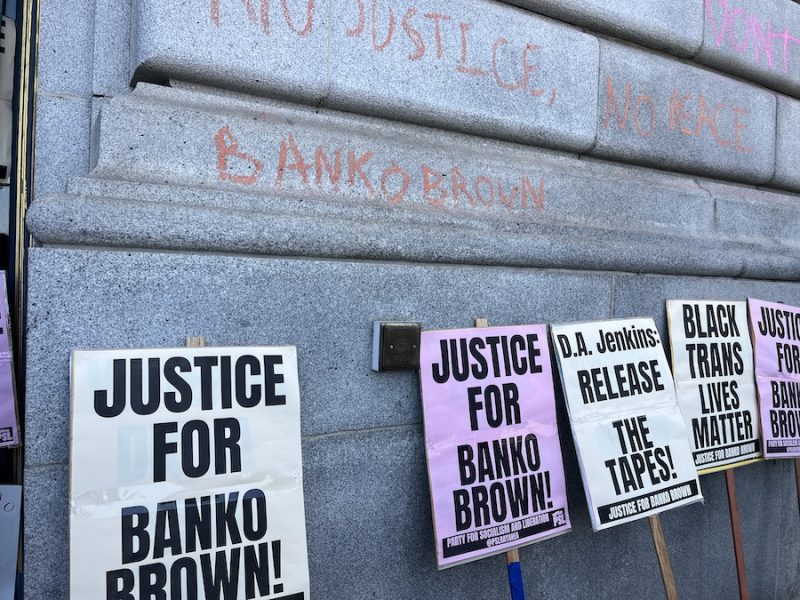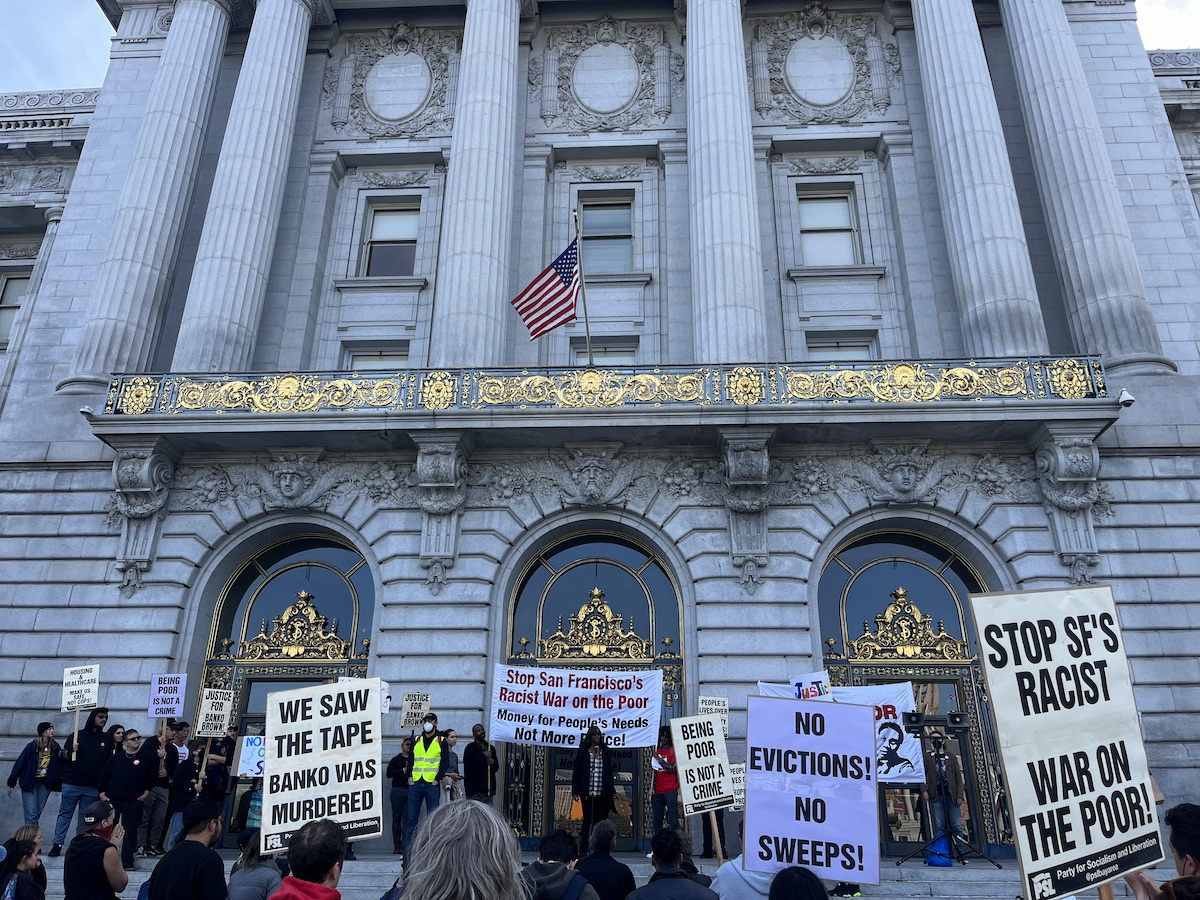Upwards of 70 people streamed into the Third Baptist Church this morning to pay respects to Banko Brown, a Black trans man who was shot and killed by a Walgreens security guard last month in an incident that has rocked San Francisco with protest and political infighting.
Family, loved ones and supporters approached a gleaming white casket topped with red and white roses, set at the foot of the stage of the historic Fillmore church where Brown, a San Francisco native, spent much of his childhood. Brown’s family and loved ones clustered in the front pews, decked out in white and red — red was his favorite color.
Services were led by Rev. Amos Brown, who earlier remembered Brown as an “inquisitive, playful” child in the parish’s children’s division.
On April 27, Brown was killed by a single shot to the chest from a Walgreens security guard. The two had clashed over allegedly stolen goods, and video of the shooting showed Brown backtracking out of the store when the guard fired.
The shooting has galvanized many of Brown’s family members and colleagues at the Young Women’s Freedom Center, who have marched and rallied at City Hall and the Walgreens where Brown was shot, criticizing the district attorney’s decision not to charge Walgreens guard Michael Earl-Wayne Anthony in the shooting.
Brown was known for customizing his clothes with spray paint, sometimes gifting them to friends. His unique style was on full display at the funeral, with attendees outfitted head-to-toe in suits with airbrushed and hand-drawn art honoring Banko Brown.
Brown is survived by his father, Terry Brown; stepmother, Barbara Brown; birth mother, Kevinisha Henderson; and siblings Charles, 36; Terry Jr., 23; Tealiyah, 13; and True, 4.
“[He’s] loved by so many people, because [he] was a loving, loving, loving person,” said Terry in the weeks before the services.
“I told [him], ‘You live your truth; don’t let nobody say you can’t live your truth,’” said Terry, tearing up. “If somebody doesn’t let you live your truth, they don’t love you.”
“The Friday before [he] got shot, [he] texted me ‘Dad.’ That was [his] way to communicate [he] was all right. Looking at pictures of [him], it just breaks my heart.”
This morning’s services were as much a homecoming as a salute to Brown’s life. Brown’s father, Terry, was also a parishioner of Third Baptist throughout his own childhood on nearby Oak Street.
Shortly before the funeral, Oakland Mayor Sheng Thao declared May 26 Banko Brown Day. Brown’s mentor, Xavier Davenport, brought the plaque signed by Thao to present to the family. Brown had lived in and out of Oakland in recent years while working at Crumbl Cookie farther east.
After spending his early years with family in Richmond, Brown grew up in the Mission’s Valencia Gardens along with his father and brother, Terry Jr., where their father made sure they were part of the historic church, which has played a major role in Black and LGBTQ struggles since its founding in 1976.
“You have to go all the way back,” said Rev. Brown — no relation — a day before the funeral, on his relationship with the Browns. “The whole Brown family is from Mississippi. They’re all from the South. This is part of our culture.”
“Banko was part of the children’s division, Ms. Cynthia Woods was [his] Sunday school teacher since [he] was eight years old, off and on through high school.”
“This whole situation surrounding Brown’s death,” said Rev. Brown, from the killing of a young trans man to the life of the security guard, who also faced homelessness and abuse as a child, is “a mirror by society of the brokenness of San Francisco when it comes to the Black community.”
After spending his early life with Terry in Richmond, Brown attended Sanchez Elementary School and Everett Middle School, and graduated from Galileo High School in 2017.
“Hello, money!” Brown would greet friends, making sure everyone around him felt his love.
“To this day, my niece asks about her tickle monster,” remembered on-again-off-again girlfriend, Mystic Cesar. “That’s [Brown’s] nickname they came up with together.”
“Banko got my name tattooed on one arm, and on the other arm it says ‘Lula’ — his grandmother’s name,” Cesar added. His grandmother, a beloved fixture in his life, died in 2016.
Following introductory speeches from Rev. Brown and Rev. Ronson Ballard, a confrontation within the family broke out over the apparently accidental omission of Kevinisha Henderson, Brown’s birth mother, from one pastor’s remarks.
As Rev. Ballard returned to his seat following remarks, several in the front row shouted and called Henderson’s name. Henderson had traveled from Texas for the services. She stood up and addressed Rev. Brown from the front pew. Emotions were high and, abruptly, ensued in a flurry of red and white, with shoving and shouting between attendees.
Barbara Brown walked up onto the stage and attempted to command the room: “This is for Banko Brown! This is not respectful to Banko!”
After about 10 minutes, things began to settle back down as Rev. Brown bellowed into the microphone. He walked back and forth across the stage, and began recounting the plot of William Golding’s “Lord of the Flies,” comparing the present fight to the chaos among the “young white boys” in the book.
America makes “young, beautiful, erudite” people into “savages,” said Rev. Brown.
As many present murmured, nodding in assent, Rev. Brown told the crowd: “This is what America has done to you.” Just a moment before, he said, the room had devolved into “anarchy.”
“Yesterday,” said the reverend, “in Burlingame, I was asked to meet with an 8-year-old Black girl in an elementary school with only three Black students. An 8-year-old white boy had called her trash, and spat in her face.”
Silence overtook the room.
“He got it from somewhere,” said Rev. Brown. “He got it from home. He got it from society. America has treated us as if we were trash.” Cheers around the room.
“Banko — he’s gone far too soon. [He] had something to give society. Oliver Wendell Holmes said: ‘Many of us die with our music still in us.’ Banko died, music still in him.”
“We are somebody,” said the reverend as the crowd listened. “Society must stop short changing our Black children.”
Services continued, but were shortened by the earlier skirmish. Afterwards, in front of the church, loved ones wailed and held each other.
John Burris, the family’s attorney, was not surprised at the morning’s heightened emotions. “This is how it is; there’s still so many questions,” he said. Burris confirmed that tomorrow he will be filing a civil lawsuit against Walgreens, their former security company Kingdom Protective Services Group, and the security guard on behalf of the Brown family.
Before ducking into a car, Terry Brown, Sr. shook his head, eyes shining. He was dismayed at the services.
“So embarrassing,” he said, putting a hand to his forehead. “We couldn’t even do it right for [him].”
The family’s convoy departed, heading out to Brown’s burial at Rolling Hills in Richmond.






let this family grieve in private and withhold your commenting judgement for yourselves
Very sad. They couldn’t do it right for Banko when he was here and after he was gone. Disrespectful to thh h e memories of Banko Brown. Now lining up to get a piece of the Burris pie.